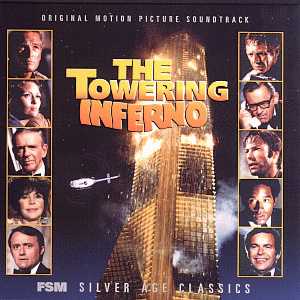Also known as the one before Jaws, this is an interesting bridge of styles for Williams. Having been subservient to the pop-oriented demands of the day on something like Earthquake the year before, it's fascinating to note the strong orchestral writing underlining disaster-style danger throughout. There are several points which foreshadow the direction Jaws would take (e.g. in "The First Victims"), and there's even a passage in the finale of the 9-minute knuckle-biter "Planting the Charges" that looks ahead to the Death Star trench assault from Star Wars.
Comparisons aside, this was always amongst the best of the composer's pre-blockbuster days. The 4-note rescue theme that's introduced during the dramatic "Main Title" is a malleable motif capable of stretching from the tragedy of someone in flames to the endless heroics of Paul Newman's fire-fighter. It undergoes plenty of variation throughout the romantic sub-plotting and OTT rescue attempts. At a very subtle level, this reviewer was most impressed to be reminded with how Williams underscored the first indication of disaster in the cue "The Flame Ignites" where a tinkling effect is as insinuating as an unheard alarm bell.
Only a few of the pop-styled source pieces have made it onto this capacity full album thankfully. Williams' own "Lisolette and Harlee" has that chucka-chucka Seventies guitar riff going on under drumset and muted cymbals. Then the song "We May Never Love Like This Again" by Al Kasha and Joel Hirschhorn is a warranted inclusion since Williams incorporated its melody into the body of his score. At track 9 of 28 it's a bit of a jarring change of pace though! Its placement is down to the album's chronological order, which means it appears as it did to the opening party for Glass Tower. That said, there has been some small fudging with cue order, but this is explained in the ample booklet notes in detailing the locating of this music from both the Fox and Warner archives (who jointly bankrolled the movie).
Rediscovering Williams' roots is never a chore, and this should appeal to fans and freshman alike.
Paul Tonks





